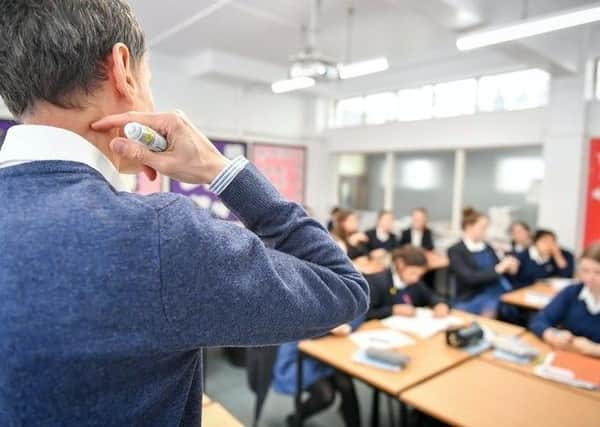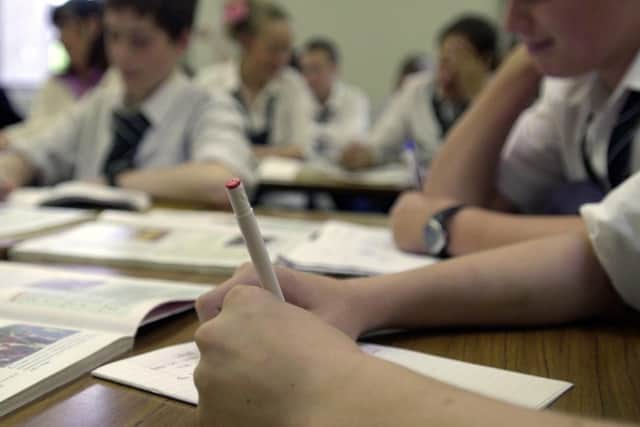How schools must give students grounds for hope in pandemic – David Alcock


But what if we can do more than that? What if we can help our young people to be more hopeful about their future?
Many things that happened in 2020 were, of course, extremely worrying. Young people’s mental health has been under especial pressure from coronavirus restrictions. Their education has been disrupted, their social lives have been curtailed, and this has sometimes been exacerbated by the loss or suffering of loved ones.
Advertisement
Hide AdAdvertisement
Hide AdOther global problems have also challenged their collective sense of wellbeing: these include global conflicts, racial and other inequalities, ecosystem loss and climate change.


In response to this combination of concerns, Childline published a section of their website supporting young people who have been upset by the continuing slew of bad news.
Childline’s suggestions are sensible: talk to someone they trust, let their feelings out before they react, take a break from the news, check their sources of information, and do something positive.
But it shouldn’t be up to charities alone to address the fears of our young people. Crudely simplified, our worldviews – whether fearful or hopeful – are formed by four influences.
Advertisement
Hide AdAdvertisement
Hide AdThe first is our unavoidable unconscious psychological biases, for example, to seek information which confirms our pre-existing opinions.
The second is our personal experiences. The third influence is the media, which often focuses on short-term, exceptional, and usually negative events, and downplays more gradual, commonplace, and positive trends.
The fourth influence on our worldviews is education. Curriculum and lesson content, textbooks and other resources, and day-to-day interactions are crucial in this regard.
I argue that education should lift young people’s eyes up from today’s disheartening news stories and help them to develop a balanced understanding of humanity’s achievements and failures.
Advertisement
Hide AdAdvertisement
Hide AdIt should champion humanity’s achievements and pay close attention to our fundamental decency: both are lost in news stories in some sections of the media which ‘dog whistle’ to play on our unconscious biases.
A good education should therefore create the conditions for a hopeful worldview. Such a worldview would not ignore day-to-day news stories, and nor would it be uncritical of economic and social failings or of environmental crises. Instead, it would contextualise them.
It would not underplay young people’s anxieties. But it would embolden them to develop a sense of agency, as they would be able to draw confidence from previous successes, such as victories in women’s rights, racial equality legislation and pollution control.
What might this ‘hopeful education’ look like in schools? I sent a survey to all Year 10 students at my school, and they were more ‘worried’ than ‘hopeful’ about almost all global issues. Teachers then ran a day of talks and workshops aimed at giving the students ‘Grounds for Hope’.
Advertisement
Hide AdAdvertisement
Hide AdWe started by asking them to ‘accept the emotion but challenge the thought’, by presenting evidence which showed that many of the issues they feared the most had either improved or, like terrorism, were reported by the media out of all proportion to their actual frequency.
We then celebrated the success of social reformers, scientists, and activists, for example those who battled racism, diseases, and pollution, and those who developed labour-saving devices that we take for granted, such as the washing machine.
Norman Borlaug was one such scientist: he saved a billion lives through his spearheading of the Green Revolution via disease and drought-resistant crops, but he is often overlooked in school curricula. We also examined how music, prose and poetry can foster hope in uncertain times.
In the post-event survey, the students had developed a worldview which was more ‘hopeful’ than ‘worried’ in all global issues. These young people now viewed the world – and their future – with a more keenly developed sense of agency.
Advertisement
Hide AdAdvertisement
Hide AdThis may be the start of a long journey, but in these tough times, planting the seeds of hope is the least that educators can do.
David Alcock is a geography teacher at Bradford Grammar School and founder of Hopeful Education @HopefulEd.
Support The Yorkshire Post and become a subscriber today. Your subscription will help us to continue to bring quality news to the people of Yorkshire. In return, you’ll see fewer ads on site, get free access to our app and receive exclusive members-only offers. Click here to subscribe.
Comment Guidelines
National World encourages reader discussion on our stories. User feedback, insights and back-and-forth exchanges add a rich layer of context to reporting. Please review our Community Guidelines before commenting.